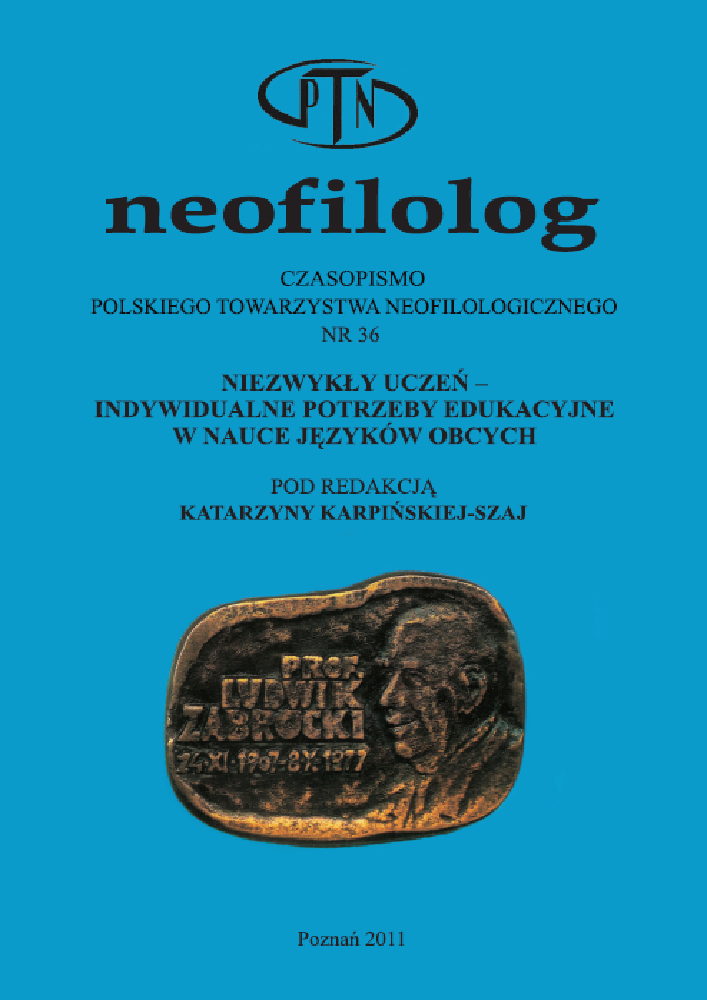Résumé
The paper reports the findings of a study that the author conducted in order to investigate the possibility of developing communicative compe-tence in a learner with Asperger‟s Syndrome. Information about the dis-order is followed by enquiry into the notion of the theory of mind which is said to determine the ability to communicate effectively. Since patients with Asperger‟s Syndrome do not demonstrate theory of mind, it is be-lieved they are unable to develop communicative competence. However, the literature in the field points to the therapeutic aspects of foreign lan-guage teaching and therefore the author explored the possibility of im-proving communicative skills in the case of a 13-year-old boy diagnosed with Asperger‟s Syndrome.
Références
Allman, T. 2009. Asperger’s Syndrome. Farmington Hills, MI: Lucent Books.
Atwood, T. 2007. The complete guide to Asperger’s Syndrome. London: Jessica Kingsley Publishers.
Baron-Cohen, S. 1995. Mindblindness: an essay on autism and theory of mind. MIT Press/Bradford Books.
Baron-Cohen, S., Leslie, A. M. i Firth, U. 1985. „Does the autistic child have a theory of mind?” Cognition, 21 (1985) 37-46.
Canale, M. i Swain, M. 1980. „Theoretical bases of communicative approaches to second language teaching and testing”, Applied Linguistics 1: 1-47.
Celce-Murcia, M. 2007. „Rethinking the role of communicative competence in language teaching”, w: Soler, E. A. i Jorda, M. P. S. (red.) Intercultural lan-guage use and language learning. Dordrecht: Springer, 41-59.
Emmons, P. G. i Anderson, L. M. 2007. Dzieci z zaburzeniami integracji sensorycznej. Warszawa: K. E. Liber.
Hymes, D. 1972. „On communicative competence”, w: Pride, J. B. i Holmes, J. (red.) Sociolinguistics. Harmondsworth: Penguin, 269-293.
Karpińska-Szaj, K. 2006. „Integracyjna koncepcja nauki języka obcego na potrzeby uczniów z niedoborami języka pierwszego”, w: Krieger-Knieja, J. i Paprocka-Piotrowska, U. (red.). Komunikacja językowa w społeczeństwie informacyjnym. Nowe wyzwania dla dydaktyki języków obcych. Lublin: Towarzystwo Naukowe KUL, 56-63.
Kurcz, I. 2005. Psychologia języka i komunikacji. Warszawa: Wydawnictwa Naukowe Scholar.
Nattinger, J. R. i DeCarrico, J. S. 1992. Lexical phrases and language teaching. Ox-ford: Oxford University Press.
Oxford, R. 1990. Language learning strategies: what every teacher should know. Boston, MA: Heinle & Heinle.
Pawley, A. i Frances S. 1983. „Two puzzles for linguistic theory: nativelike selec-tion and nativelike fluency”, w: Richards, J. C. i Schmidt, R. W. (red.) Language and communication. London: Longman, 197-227.
Premack, D. i Woodruff, G. 1978. „Does the chimpanzee have a theory of mind?” Behavioral and Brain Sciences, vol 1. 515-526.
Rausch, J. L., Johnson, M. E. i Casanova, M. F. 2008. Asperger’s Disorder. New York: Informa Healthcare Ltd.
Siek, Piskozub, T. i Wach, A. 2006. Muzyka i słowa. Rola piosenki w procesie przyswajania języka obcego. Poznań: Wydawnictwo Naukowe UAM.
Licence
© Tomasz Róg 2011

Ce travail est disponible sous licence Creative Commons Attribution - Pas de Modification 4.0 International.
Auteurs :
Les auteurs de textes acceptés pour publication dans la revue Neofilolog sont tenus de remplir, signer et renvoyer à l'adresse de la rédaction, un accord sur l'octroi d'une licence gratuite pour les œuvres, avec obligation d'accorder une sous-licence CC.
En vertu de cet accord, les auteurs des textes publiés dans la revue Neofilolog accordent à l'Université Adam Mickiewicz de Poznań une licence non exclusive et gratuite et permettent l'utilisation de la sous-licence Creative Commons Attribution-NoDerivatives 4.0 International (CC BY-ND 4.0).
Les auteurs se réservent le droit de disposer librement de l'œuvre.
Utilisateurs :
Les utilisateurs d'Internet intéressés ont le droit d'utiliser les œuvres publiées à partir de l'année 2017 sous réserve des conditions suivantes :
- reconnaissance de la qualité d'auteur - l'obligation de fournir des informations sur la qualité d'auteur, le titre, la source (liens vers l'œuvre originale, DOI) et la licence, ainsi que l'œuvre distribuée ;
- sans créer d'œuvres dérivées - l'œuvre doit être conservée dans sa forme originale, p. ex. les traductions ou les interprétations ne peuvent être distribuées sans le consentement de l'auteur.
Tous les textes publiés sont soumis au droit d'auteur.
Autres :
L'Université Adam Mickiewicz de Poznań se réserve le droit à la revue dans son ensemble (mise en page, forme graphique, titre, conception de la couverture, logo, etc.).
.
